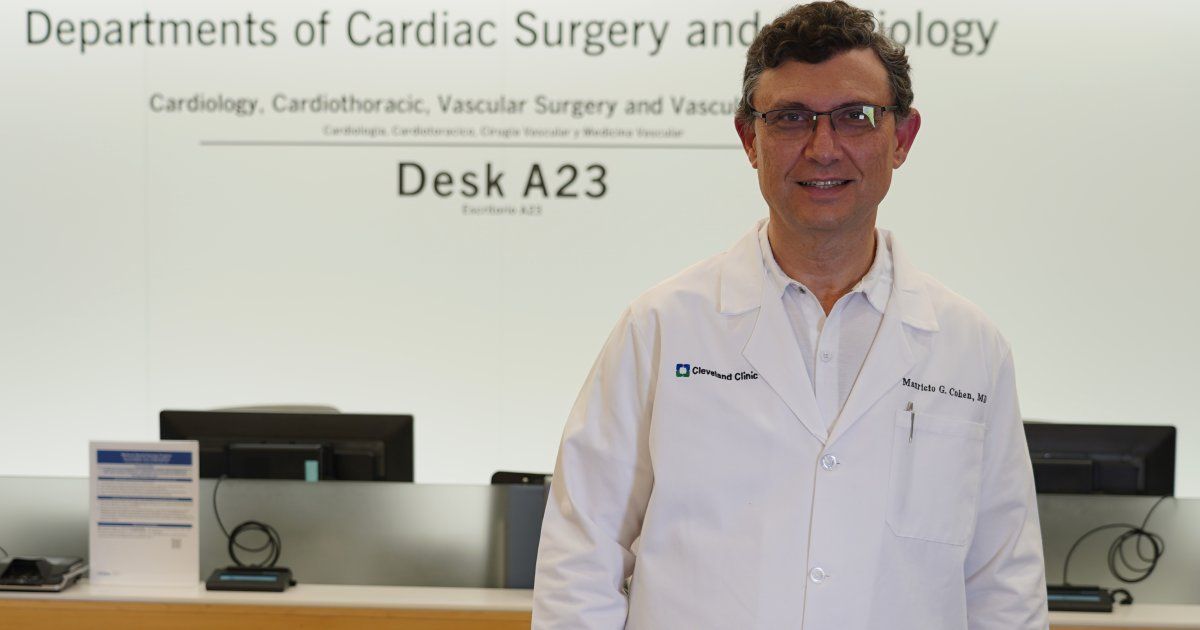According to the Centers for Disease Control and Prevention (CDC), an estimated 2.5 million people each year suffer a heart attack or undergo surgery to clear or bypass blocked coronary arteries, and another 7 million people live with chest pain caused by narrowed blood vessels.
That’s why hospitals like Cleveland Clinic work tirelessly to win the fight against heart disease by creating research teams elitebringing together the most prominent physicians in the area, including Dr. Mauricio Cohen, director of the Structural Cardiology Program at Cleveland Clinic.
“Since March 2023 I have been part of this establishment of healthwhich makes me very happy because here I have found a level of integration and camaraderie in the team doctor “This is something that is rarely seen. Cleveland Clinic is a special place where we all give our best in areas such as interventional cardiology, cardiovascular surgery, heart failure, electrophysiology, heart transplants and much more. In addition, all of us professionals meet frequently to talk about our patients, managing to develop treatments that fit the needs of each patient, that is, the service is personalized,” said the distinguished Argentine doctor.
“I am pleased to share that our results for structural interventions are excellent, and we recently performed our 300th heart transplant. Case volume has increased significantly over the past 12 months, and recovery is extremely rapid. For example, some patients are discharged the same day after transcatheter aortic valve replacement, which is performed via catheters inserted in the groin. In addition, we offer minimally invasive solutions for patients with mitral valve disease, tricuspid valve disease, pulmonary valve disease, and adult congenital heart disease,” he said.
Sobre Cleveland Clinic
Known nationally and internationally for its Department of Cardiovascular Medicine, which has physicians from all cardiovascular specialties working to offer the latest interventional procedures for heart disease, Cleveland Clinic also has a Department of Thoracic and Cardiovascular Surgery, which is recognized as one of the largest in the country, serving patients from around the world.
“Our surgeons offer virtually every type of cardiac surgery, including elective or emergency surgery for valvular heart disease, aortic aneurysm, coronary artery disease, arrhythmias, heart failure, Marfan syndrome, and many more,” said Dr. Mauricio Cohen of the facility that treats conditions previously considered inoperable, with success rates above the national average.
“This is achieved because we use the most innovative surgical techniques, equipment and devices, such as minimally invasive surgery, the bypass pump-free, robotic assistance and percutaneous procedures,” he added.
It is worth noting that the establishment also has a Department of Vascular Surgery that performs more than 8,000 interventions a year, and is recognized by its doctors who are leaders in the treatment of aneurysmal, peripheral and cerebrovascular diseases.
“Our Heart, Vascular and Thoracic Institute also has physicians who are leaders in surgical treatments for lung and esophageal diseases, including lung cancer, chronic obstructive pulmonary disease, pulmonary insufficiency, esophageal cancer, Barrett’s esophagus, achalasia and hyperhidrosis,” said Dr. Cohen.
About Dr. Mauricio Cohen
Born and raised in San Miguel de Tucumán, capital of the province of Tucumán in northwestern Argentina, Mauricio Cohen graduated as a doctor and subsequently completed a successful residency at the Italian Hospital in Buenos Aires, where he practiced cardiology and internal medicine for four years, later developing interventional cardiology.
Due to his great talent and skill in the area, Dr. Cohen was awarded a scholarship by the Latin American Society of Interventional Cardiology (SOLACI), and managed to reach Duke University in North Carolina, United States, in 1997, where he remained for three years doing research and training in interventional cardiology.
“When I returned to Argentina, I worked at the Italian Hospital in Buenos Aires in the interventional cardiology department, but then I received a job offer from the University of North Carolina at Chapel Hill to be an assistant professor, so I decided to formally begin my career in the United States, taking advantage of the opportunity that arose in 2003,” recalled the cardiologist, who laughed and said that he comes from a family of doctors, since his father was an otorhinolaryngologist, as was his older brother, and his third brother, who is an ophthalmologist.
“My father was the son of Jewish immigrants from Eastern Europe, and he was the first professional in the family,” said the proud doctor, who emphasizes the humility and discipline that was instilled in him from early childhood.
After conducting research, teaching, and patient care with excellence, in 2009 – when the University of Miami was beginning to assemble a group of pioneering physicians in stem cells, electrophysiology, and interventional cardiology – Dr. Cohen was recruited by this group of professionals, beginning his career in South Florida as director of the catheterization laboratory at the new University of Miami hospital.
“This is a career that requires a lot of time, enthusiasm, and dedication, because we never stop studying, but learning and helping patients is what motivates me and helps me get ahead,” he concluded.
If you would like to learn more about Cleveland Clinic, please visit

